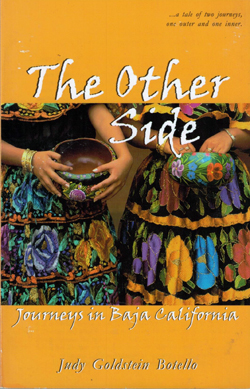
 SAN DIEGO – With ethnic studies being required in K-12 public school and at the California State University, I recently picked up a book published by my friends at Sunbelt Publishing in El Cajon to engage in some welcome learning about another ethnicity.
SAN DIEGO – With ethnic studies being required in K-12 public school and at the California State University, I recently picked up a book published by my friends at Sunbelt Publishing in El Cajon to engage in some welcome learning about another ethnicity.
The Other Side: Journeys in Baja California by Judy Goldstein Botello, which I chose from Sunbelt’s warehouse at 1250 Fayette Street was not newly issued, but it was on topic and quite readable.
Although Goldstein Botello is a Jewish doctor, there are only fleeting references to her own heritage – symbolized by a Star of David necklace that she wears – in a narrative more focused on the family warmth and generosity of people she meets in Baja California on trips there with Carlos, her Mexican Catholic husband-to-be, and her children by a previous marriage, Cathy and Josh.
In this 1998 memoir, she told of the time that their car and that of some friends were stranded near El Rosario, where rains had cut a torrent across a north-south dirt road. They saw on their side of the new river, a house with a yard on the hill above, and there they made inquiries of a Senora Duarte whether it would be okay to camp on the family’s property.
“They regarded us calmly, unsurprised to find six norteamericanos on their doorstep seeking shelter. Pitch a tent in their yard? Certainly not … But their home was our home. There were two beds, they pointed out, one for each family. Where would they sleep? We asked. This question was dismissed with a wave of the hand as too trivial to even answer. We were ushered in and shown two tiny bedrooms, each just large enough for the one double bed it contained….”
In a later portion of the book, she described her attendance at a family dinner in Ensenada:
“The meal went on for over an hour, during which time an astonishing number of relatives appeared. A young woman in a business suit came in as the food was being set out on the table, and two young men carrying briefcases appeared a few minutes later. Children of varying ages ran in and out of the house, most of them dressed in school uniforms. Each child went around the table and greeted everyone with a kiss before sitting down to eat. Cathy and I were included in the kissing and conversation without question, like members of the family….”
Warmth and acceptance, those are among the most endearing aspects of Mexican culture.
In San Ignacio, Goldstein Botello thought she would be a spectator at a Christmas mass at the local church. It was a surprise for her, to say the least.
“When the priest finished reading, he stepped down from the dais and stood in front of the nave. With head bowed, he extended his arms to the people. In them he held – to my utter astonishment – a small, well-worn doll. It was a baby doll, such as a child might use, with plastic head and limbs and a cloth torso. The doll was unclothed and uncovered, and, for me, the sight was so incongruous that I almost laughed out loud …. Somehow, I found myself in the surging crowd and pushed toward the priest. My discomfort was rising toward panic; frantically I looked around for escape but found none … Then I was there, and as I bent to kiss the Holy Child, my tears mingled with the salt of those who had gone before, and for a moment I thought that He smiled at me. Then I was out in the cool night air, stumbling down the smooth stone steps to the plaza. A young man with kind eyes caught my elbow to steady me. “Feliz Navidad,” he said, and smiled.
Although she often had felt out of place, especially in the surging crowd at the church, Goldstein Botello had come to appreciate and love the Mexican people. Thus, one day, back in San Diego County, she was shocked when she received a flyer from school officials in the aftermath of a young girl being accosted and sexually molested by a Mexican man, who was later arrested. The flyer began: “We are all aware of the recent influx of Mexicans into our community. Because of the rise in the crime rate associated with these demographic changes, we are recommending that those of you with children who walk to and from school arrange for your child to be escorted by an adult…”
As you might imagine, the generic attack on Mexicans did not sit well with Goldstein Botello.
“How dare they assume that more Mexicans mean more crime? That’s just pure racism.”
After relating the incident to Carlos, she began to cry.
“’Mirasol,’ he whispered, ‘now you’re really Mexicana. Don’t let them get you down. You have to believe in yourself.’”
*
Donald H. Harrison is editor of San Diego Jewish World. He may be contacted via donald.harrison@sdjewishworld.com